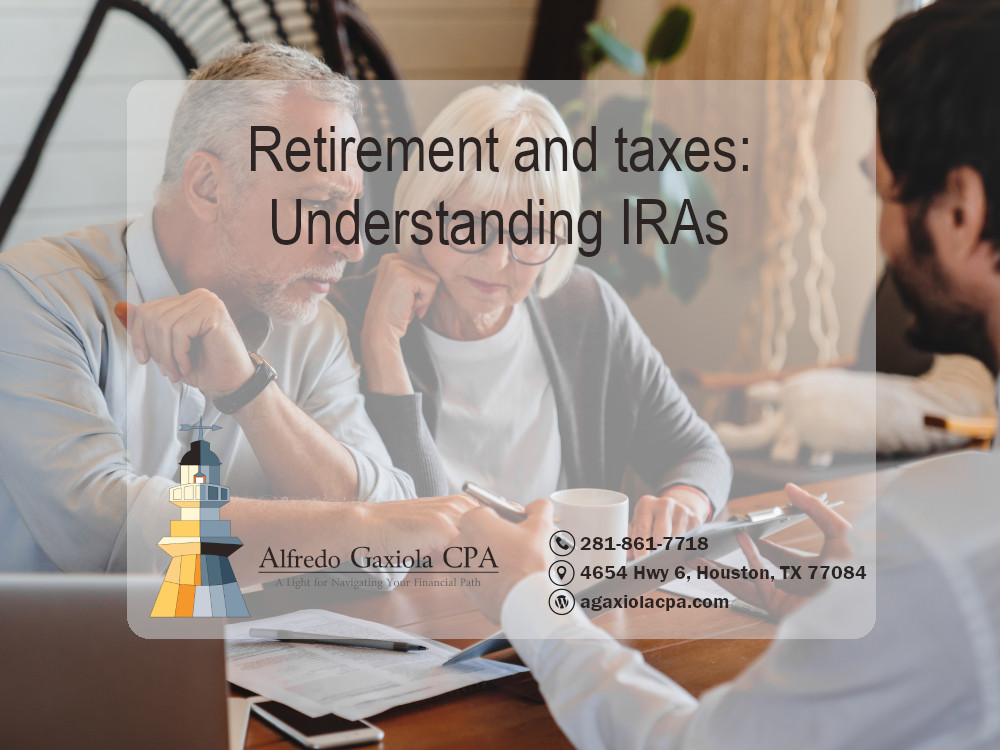
Retirement and taxes: Understanding IRAs
IRS representation in Houston
Individual Retirement Arrangements, or IRAs, provide tax incentives for people to make investments that can provide financial security for their retirement. These accounts can be set up with a bank or other financial institution, a life insurance company, mutual fund or stockbroker.
Here's a basic overview to help people better understand this type of retirement savings account.
- Contribution. The money that someone puts into their IRA. There are annual limits to contributions depending on their age and the type of IRA. Generally, a taxpayer or their spouse must have earned income to contribute to an IRA.
- Distribution. The amount that someone withdraws from their IRA.
- Withdraws. Taxpayers may face a 10% penalty and a tax bill if they withdraw money before age 59 ½, unless they qualify for an exception.
- Required distribution. There are requirements for withdrawing from an IRA:
- Someone generally must start taking withdrawals from their IRA when they reach age 70½.
- Per the 2019 SECURE Act, if a person's 70th birthday is on or after July 1, 2019, they do not have to take withdrawals until age 72.
- Special distribution rules apply for IRA beneficiaries.
- Traditional IRA. An IRA where contributions may be tax-deductible. Generally, the amounts in a traditional IRA are not taxed until they are withdrawn.
- Roth IRA. This type of IRA that is subject to the same rules as a traditional IRA but with certain exceptions:
- A taxpayer cannot deduct contributions to a Roth IRA.
- Qualified distributions are tax-free.
- Roth IRAs do not require withdrawals until after the death of the owner.
- Savings Incentive Match Plan for Employees. This is commonly known as a SIMPLE IRA. Employees and employers may contribute to traditional IRAs set up for employees. It may work well as a start-up retirement savings plan for small employers.
- Simplified Employee Pension. This is known as a SEP-IRA. An employer can make contributions toward their own retirement and their employees' retirement. The employee owns and controls a SEP.
- Rollover IRA. This is when the IRA owner receives a payment from their retirement plan and deposits it into a different IRA within 60 days.
Source: IRS

Alfredo Gaxiola has worked on numerous IRS problem cases and has successfully settled with the IRS to release liens on houses, bank accounts and wages and, if needed, setting a payment installment plan that is not burdensome for the client. He has conducted appeals before the U.S. Tax Court and obtained favorable resolutions in reducing the tax debt of his clients. Mr. Gaxiola served as Treasurer of Camara de Empresarios Latinos, one of the largest and strongest Hispanic organizations in the city of Houston. He has conducted financial and accounting seminars for the Houston Small Business Development Corporation, as well.
IRS representation in Houston
Certified Public Accountant in Houston, Alfredo Gaxiola CPA in Houston, Certified QuickBooks Proadvisor in Houston, QuickBooks Set Up and Training in Houston, Business Tax Return in Houston, Personal Tax Returns in Houston, Quarterly & Monthly Filings in Houston, Financial Statement Preparation in Houston, Consulting Services in Houston, Payroll Preparation in Houston, Bookkeeping Services in Houston, Bank Financing in Houston, IRS representation in Houston
(281) 861-7718
This email address is being protected from spambots. You need JavaScript enabled to view it. This email address is being protected from spambots. You need JavaScript enabled to view it. Location
(281) 861-7718 This email address is being protected from spambots. You need JavaScript enabled to view it. This email address is being protected from spambots. You need JavaScript enabled to view it.
Location
© Alfredo Gaxiola, CPA. All rights reserved.
Website designed by LaraNet | Expand Your Business!



